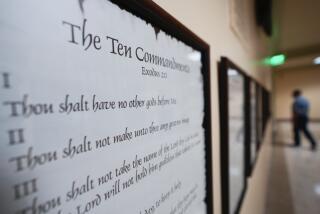Debate Over Ohio Motto
- Share via
Re “Lawsuit Against Ohio’s Motto Places God at Center Stage,” April 26: Contrary to the ACLU and the two judges it has duped, the 1st Amendment only prohibits Congress (and, by extension, the states) from passing laws respecting an establishment of religion. It does not bar any legislative body from passing nonbinding resolutions, and state mottoes clearly fall within that category. If any Ohio resident has suffered legal repercussions for not believing that all things are possible with God, let him be the one to sue; otherwise, let’s leave well enough alone.
One can only wonder what the ACLU is going to ask for next time.
JEFF BISHOP
Culver City
*
Your editorials seem to say it’s OK to split hairs over the right to free speech, the right to own handguns, the right to life, the rights of a 6-year-old Cuban refugee, ad nauseam--but draw the line when it comes to the constitutional separation of church and state. Your April 28 editorial, “Nonsense-Making Over Religion,” derides the debate over Ohio’s state motto, “In God, all things are possible,” as little more than “a ridiculous extreme” and “the latest legal nonsense-making over religion.” Why are some rights worthy of close examination but not others?
To nonbelievers such as myself, it’s a no-brainer that Ohio’s motto endorses Christianity, as does the “In God We Trust” on our currency and the “One nation, under God” line in the Pledge of Allegiance. Freedom of religion means keeping all religious references where they belong--in the private sector, not in matters of the state.
KIMBERLIE NITTI
Woodland Hills
More to Read
Sign up for Essential California
The most important California stories and recommendations in your inbox every morning.
You may occasionally receive promotional content from the Los Angeles Times.













